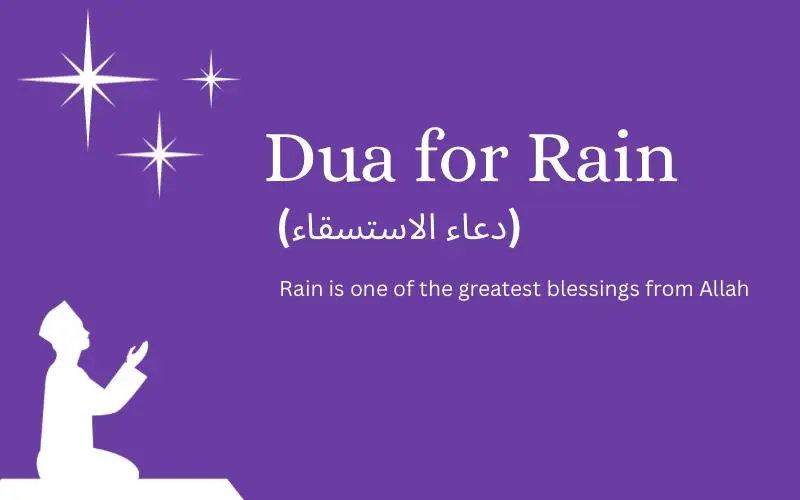Rain is one of the greatest blessings from Allah (SWT). It nourishes the earth, replenishes water resources, and brings life to barren lands. However, in times of drought or insufficient rainfall, Muslims are encouraged to turn to Allah in supplication and prayer. This special prayer is known as Salat al-Istisqa (صلاة الاستسقاء), and it is accompanied by a dua for rain.
In this comprehensive blog post, we will explore:
- What is Salat al-Istisqa?
- Authentic Dua for Rain from Hadith
- Arabic text with transliteration and translation
- The etiquette and Sunnah of making dua for rain
- Tips for making your dua more effective
Let’s begin by understanding the importance of this powerful supplication.
What Is Salat al-Istisqa (صلاة الاستسقاء)?
Salat al-Istisqa is a special prayer offered during times of drought or when rain is needed. The term “Istisqa” (الاستسقاء) means “to seek water” or “to ask for rain”. This prayer is a Sunnah established by the Prophet Muhammad ﷺ during periods of dryness.
The practice is based on authentic Hadiths. It is narrated by Abdullah ibn Zaid (RA):
“The Prophet ﷺ went to the praying place to offer the prayer for rain. He invoked Allah for rain and then faced the Qiblah and turned his cloak inside out.” – (Sahih al-Bukhari, Hadith 1013)
The Best Duas for Rain (أدعية نزول المطر)
There are several duas reported in the Hadith that the Prophet ﷺ used to make when asking for rain. Below are the most authentic and commonly used ones.
1. Basic Dua for Rain
Arabic:
اللَّهُمَّ اسْقِنَا غَيْثًا مُغِيثًا مَرِيئًا مَرِيعًا نَافِعًا غَيْرَ ضَارٍّ، عَاجِلًا غَيْرَ آجِلٍ
Transliteration:
Allahumma asqina ghaythan mugheethan, maree’an, maree’an, naafi’an ghayra daarrin, ‘aajilan ghayra aajil
Translation:
O Allah, give us beneficial rain, plentiful, wholesome, and not harmful; soon and not delayed.
This duaٍ is a powerful and comprehensive supplication for rain, taught by the Prophet ﷺ. It not only asks for rainfall but emphasizes that it be beneficial, abundant, pure, and free from harm, requesting it to come without delay. This reflects the deep Islamic understanding of rain as both a physical and spiritual mercy from Allah.
2. Dua When It Starts to Rain
Arabic:
اللَّهُمَّ صَيِّبًا نَافِعًا
Transliteration:
Allahumma sayyiban naafi’an
Translation:
O Allah, (make it) a beneficial rain.
This concise dua is a Sunnah supplication the Prophet ﷺ would say when rain began to fall. It beautifully captures a believer’s hope that the rain brings benefit and mercy, not harm or hardship. Simple yet profound, it reflects gratitude and trust in Allah’s wisdom.
Hadith Source:
Narrated by Aisha (RA): When the Prophet ﷺ saw rain, he would say:
“اللَّهُمَّ صَيِّبًا نَافِعًا”
3. Dua After Rain
Arabic:
مُطِرْنَا بِفَضْلِ اللَّهِ وَرَحْمَتِهِ
Transliteration:
Mutirna bifadhlillahi wa rahmatihi
Translation:
We have been given rain by the grace and mercy of Allah.
This dua is a prophetic expression of gratitude said after rainfall, acknowledging that it is not by chance or nature, but by Allah’s grace and mercy. It reminds believers to attribute all blessings to Him alone. This dua cultivates humility, thankfulness, and a deeper awareness of Allah’s continuous care and generosity.
Hadith Source:
The Prophet ﷺ said this after rain would fall. (Sahih Muslim, Hadith 899)
How to Perform Salat al-Istisqa (Prayer for Rain)
Salat al-Istisqa is a special two-rak’ah prayer performed in congregation, typically in an open area, during times of drought or water shortage. After the prayer, the Imam delivers a khutbah (sermon) encouraging repentance, charity, and humility, often turning his cloak inside out as a symbolic gesture for changing conditions. It is a Sunnah practice rooted in the tradition of the Prophet Muhammad ﷺ. Below are some details about it:
1. When to Pray
During times of drought, dry spells, or low water levels.
Typically prayed in the forenoon (Duha).
2. Congregation
Performed in congregation, ideally in an open space (Musalla) outside the mosque.
3. Structure of the Prayer
Two Rak’ahs (units) similar to Eid prayer.
The Imam gives a sermon (Khutbah) after the prayer, reminding people to repent and seek forgiveness.
4. Turning the Cloak
The Prophet ﷺ turned his cloak inside out during the sermon to symbolize turning conditions from dryness to rainfall.
Sunnahs & Etiquettes Before Making Dua for Rain
Before making dua for rain, it is Sunnah to engage in repentance (tawbah), give charity (sadaqah), and approach Allah with humility and sincerity. Fasting and gathering in large numbers, dressed modestly and free of pride, are also recommended. These etiquettes help purify the heart and attract Allah’s mercy.
1. Repentance (Tawbah)
Seek forgiveness from Allah sincerely. Sins can be a cause of the withholding of rain.
2. Charity (Sadaqah)
Giving to those in need is recommended before making dua. It softens the heart and draws Allah’s mercy.
3. Fasting
Voluntary fasting before the prayer is also practiced by some scholars as a way to humble oneself.
4. Unity and Humility
Gathering in large numbers, dressed modestly, with sincere hearts.
5. Avoiding Oppression
Avoid injustice, as oppression is a major reason for punishment, including the withholding of rain.
Rain as a Mercy and a Test
In Islam, rain is both a mercy and a test from Allah. It brings life to the earth, nourishes crops, and quenches thirst, signs of His compassion. At the same time, excessive or withheld rain can be a trial, reminding us of our dependence on Allah and the need for gratitude, patience, and reflection. The Qur’an frequently mentions rain as a symbol of divine mercy and power.
Rain is both a mercy and a test. Allah says in the Qur’an:
“And We sent down from the sky blessed water whereby We give growth…” – (Surah Qaf 50:9)
“And He it is Who sends down the rain after they have despaired and spreads His mercy…” – (Surah Ash-Shura 42:28)
Tips for Maximizing the Effectiveness of Your Dua
Praise Allah and Send Salawat on the Prophet ﷺ
Start your dua by praising Allah and sending blessings on the Prophet.
Use Allah’s Names
Use names like Ar-Razzaq (The Provider), Al-Ghaffar (The Forgiving), Ar-Rahman (The Merciful).
Consistency and Repetition
Make dua repeatedly and regularly until the rain comes.
Have Sincerity and Yaqeen (Certainty)
Always believe that Allah will respond.
Rain is a Mercy, Dua is the Key
In times of hardship and drought, the door of Allah’s mercy is always open. Making Dua for rain is not just a spiritual ritual, but a means of reconnecting with our Creator, seeking forgiveness, and acknowledging our dependence on Him. Let us revive this Sunnah in our communities and households.
Key Takeaways:
- Salat al-Istisqa and Dua for rain are authentic practices.
- Multiple duas exist in Arabic with deep meanings.
- Combine dua with good deeds, repentance, and humility.
- Encourage your local mosque or community to organize rain prayers during dry seasons.
If you found this guide helpful, share it with your family and friends. Let’s revive this beautiful Sunnah together!
اللَّهُمَّ اسْقِنَا الْغَيْثَ وَاجْعَلْهُ بَلَاغًا لِلْعِبَادِ، آمِينَ
O Allah, bless us with rain and make it sufficient for Your servants. Ameen.
FAQs About Dua for Rain
Q1: Can I make dua for rain in my own language?
Yes. While Arabic is recommended, dua in any language is valid.
Q2: Is Salat al-Istisqa obligatory?
It is Sunnah Mu’akkadah (highly recommended), not obligatory.
Q3: Can women attend Salat al-Istisqa?
Yes, women, children, and even animals can attend based on the practice of the early Muslims.






